Femme en Action Contre la Stigmatisation el la Discrimination Sexuelle (FACSDIS) was founded in July 2010 as a response to the discrimination and violence LBT women and sex workers faced in Haiti in the context of the earthquake.
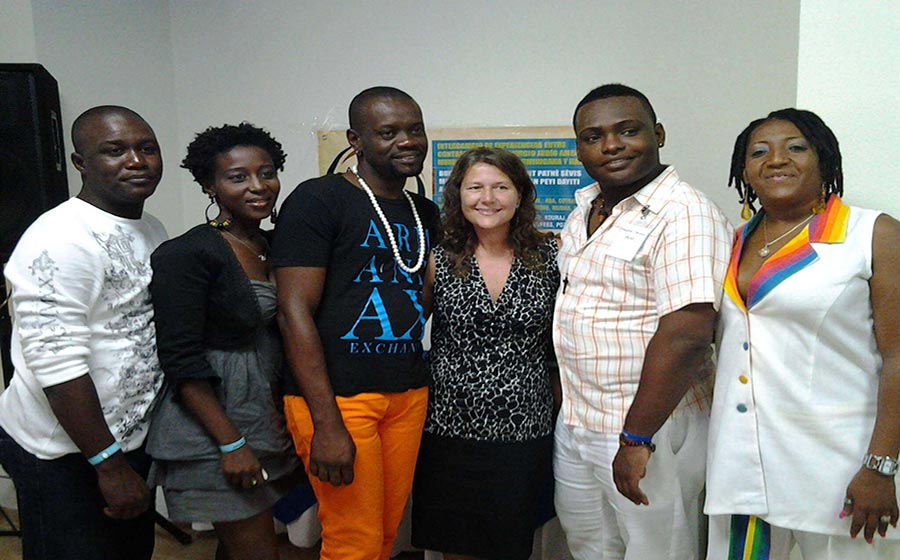
Femme en Action Contre la Stigmatisation el la Discrimination Sexuelle (FACSDIS) was founded in July 2010 as a response to the discrimination and violence LBT women and sex workers faced in Haiti in the context of the earthquake. FACSDIS’s mission is to end stigma and gender discrimination and to support the struggle of oppressed and marginalized women such as LBT women, sex workers and people living with HIV. Outside of the capital, Port Au Prince, they work with LBT women to raise awareness, build their capacity to advocate for their rights, and promote access to jobs, health care and education. They organize and respond to the rape commonly targeting butch and masculine-presenting women in the community. They work to address the stigma around rape, and they do workshops with police and judges so that their response to these cases is not lesbophobic and discriminatory, furthering the trauma and violence survivors experience. They also work with incarcerated women, LBT women and sex workers who are criminalized for who they are and have no due process; they have helped to free several LBT women who were wrongfully incarcerated.
Self-identifying as a trans* organization that fights for LGBTQ rights and human rights, Istanbul LGBTI Solidarity Association formed in 2007 in response to experiences of transphobia.
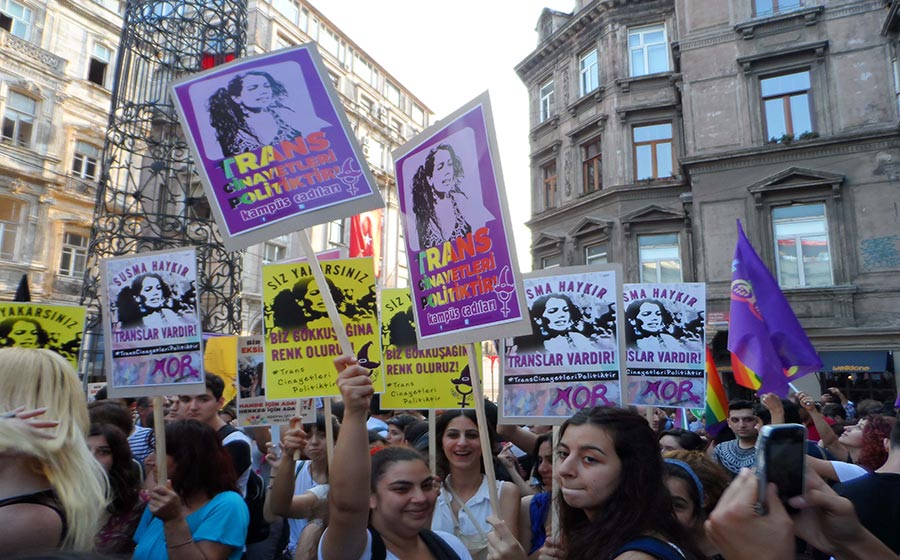
Self-identifying as a trans* organization that fights for LGBTQ rights and human rights, Istanbul LGBTI Solidarity Association formed in 2007 in response to experiences of transphobia in larger LGBT groups and out of a need to provide a space that recognized how gender identity, class and ethnicity interacted with sexual orientation. Their core activities include providing legal and social support to LGBT people who experience discriminatory or violent policing practices, monitoring transphobic hate crime cases, conducting street actions to protest human rights violations and raise awareness of trans* issues, engaging in broader movement advocacy to include SOGI protections in Turkey’s constitution, and providing trans-sensitive sexual health and psychosocial counseling. They recently supported production of a documentary film “Trans X Istanbul,” which was presented at the Istanbul International Film Festival in international competition section and won a Special Mention/Face Award. The film was used to launch a campaign against transphobic hate crimes and hate speech called the “We need a law!” campaign. Launched on Trans Day of Remembrance, 70 people from 7 cities mobilized and marched together to the parliament in Ankara. In 2013, they launched the “Trans* Guest House Project,” which continues to serve as a transitional home for queer and trans* asylum seekers from Syria, Iran, Iraq and refugees from inner Turkey.
Founded in 2010, the Queer African Youth Network (QAYN) is a queer feminist organization working to build a vast network of Support to Promote the well-being and security of LGBTQ people in West Africa and Cameroon.
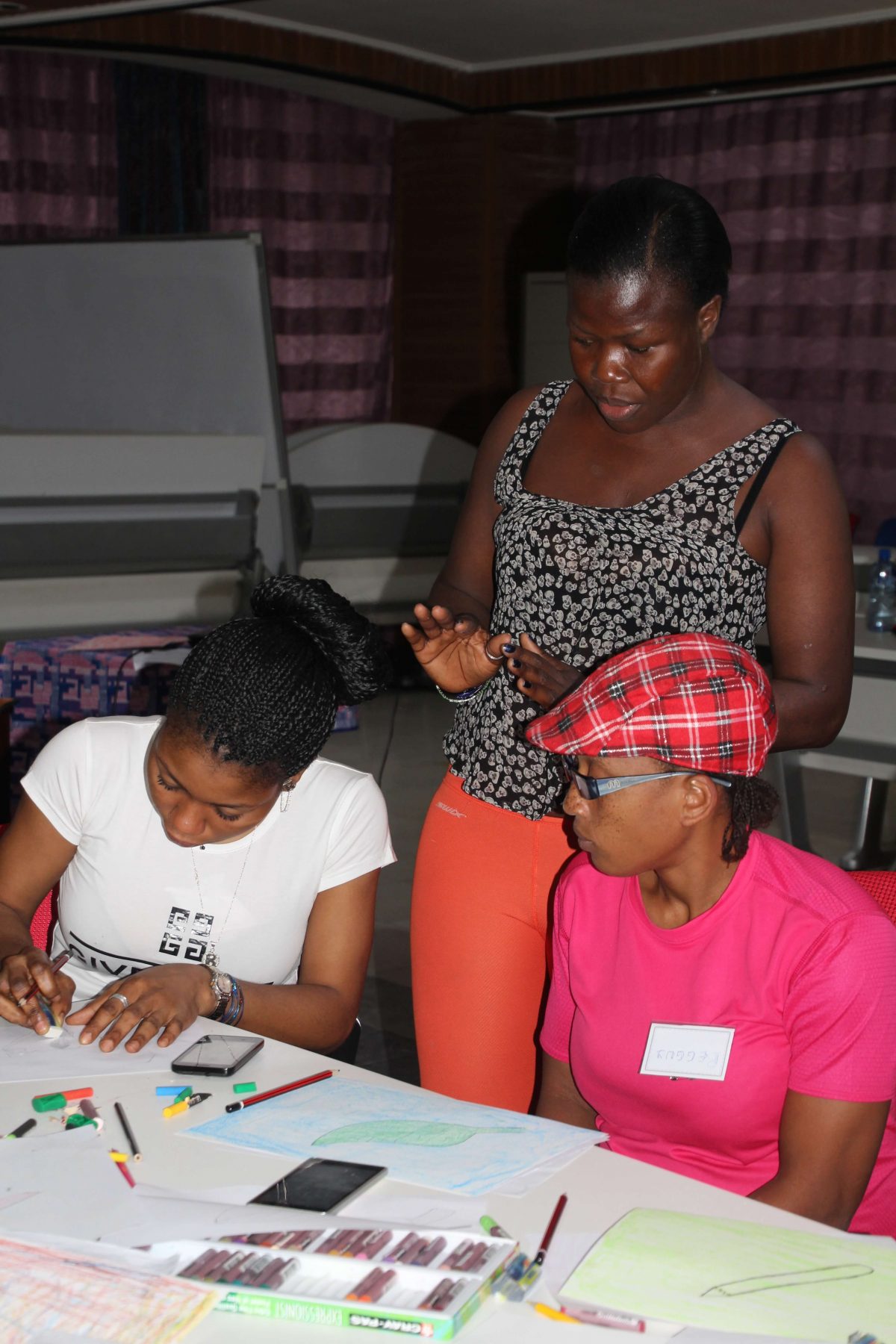
Founded in 2010, the Queer African Youth Network (QAYN) is a queer feminist organization working to build a vast network of Support to Promote the well-being and security of LGBTQ people in West Africa and Cameroon. Their work has grown to focus more broadly on facilitating and strengthening the agency and leadership of young queer women in the West African LGBTQ movements, particularly in Francophone countries. Since inception, QAYN has been instrumental in broadening the base of LBT leadership, facilitating young activist’s access to space, skill-building, and advocacy platforms. Their work is central to their capacity building programs. Their Activist School has been running since 2012. This leadership incubator program brings together activists from across the area to build collective understanding, analysis and strategies to inform Their activism. In addition, QAYN uses their publications, cultural activism, and efforts to position LGBTQ activism in a broader social justice context. Between 2015 and 2016, QAYN, in partnership with Alternative AFRO-Benin and Cote d’Ivoire, organized a series of groundbreaking cross-movement exchanges bringing together social justice and LGBTQ activists. These convenings Followed QAYN’s work to research and publish Mapping of the Social Justice Movement in West Africa and Cameroon: Perceptions on LGBTQ Issues. In 2014, they also produced a beautiful social media campaign titled 16 Voices, 16 Experiences: Queer African Women Talk about Violence, which consisted of a collection of audio stories in French and illustrations. They are now working on a picture campaign Visibility and Expression and a series of video interviews committed to building visibility around LBT activism in Francophone West Africa and Cameroon. Their Q-Zine, the only bilingual pan-African LGBTQI arts and culture digital magazine, is now in its 5th year of publication. QAYN’s goal is to provide an inspiring and creative outlet for LGBTQI and queer Africans and allies to celebrate, debate, and explore the creativity and cultural richness of queer life in Africa.
***
Fondée en 2010, le Queer African Youth Network (QAYN) est une organisation féministe queer qui travaille à construire un vaste réseau de soutien pour promouvoir le bien-être et la sécurité des LGBTQ en Afrique de l’Ouest et au Cameroun. Leurs travaux se sont concentrés plus largement sur la facilitation et le renforcement de l’agence et du leadership des jeunes femmes queer dans les mouvements LGBTQ d’Afrique de l’Ouest, en particulier dans les pays francophones. Depuis sa création, QAYN a contribué à élargir la base du leadership LBT, à faciliter aux jeunes activistes l’accès à l’espace, à la formation des compétences et aux plates-formes de plaidoyer. Ce programme d’incubation de leaders rassemble des militantEs de toute la région afin de construire une compréhension collective, des analyses et des stratégies pour informer leur militantisme. En outre, QAYN est reconnu pour ses publications, son activisme culturel et ses efforts pour placer l’activisme LGBTQ dans un contexte de justice sociale plus large. Entre 2015 et 2016, QAYN, en partenariat avec AFRO-Bénin et Alternative Côte d’Ivoire, a organisé une série d’échanges de mouvements croisés qui réunissent la justice sociale et les militants LGBTQ. Ces rencontres ont suivi les travaux de QAYN pour la recherche et la publication de «Cartographie du mouvement de justice sociale en Afrique de l’Ouest et au Cameroun: Perceptions sur les questions LGBTQ». En 2014, ils ont également produit une belle campagne sur les médias sociaux intitulée «16 voix, 16 expériences: Les femmes queer africaines parlent de la violence», qui consistait en une collection d’histoires audio en français et en illustrations. Maintenant, une campagne photo, «Visibilité et Expression» et une série d’interviews vidéo contribuent à renforcer la visibilité autour du militantisme LBT en Afrique de l’Ouest francophone et au Cameroun. Q-Zine, le seul magazine panafricain des arts et de la culture LGBTQI, magazine numérique bilingue maintenant en 5e année de publication, est l’objectif de QAYN de fournir un point de vente inspirant et créatif pour les LGBTQI et les alliés Africains pour célébrer, débattre et explorer la créativité Et la richesse culturelle de la vie queer en Afrique.
Gender Justice L.A. is a member-based, grassroots organization that works towards a safe and just society for all transgender, intersex and gender non-conforming people.
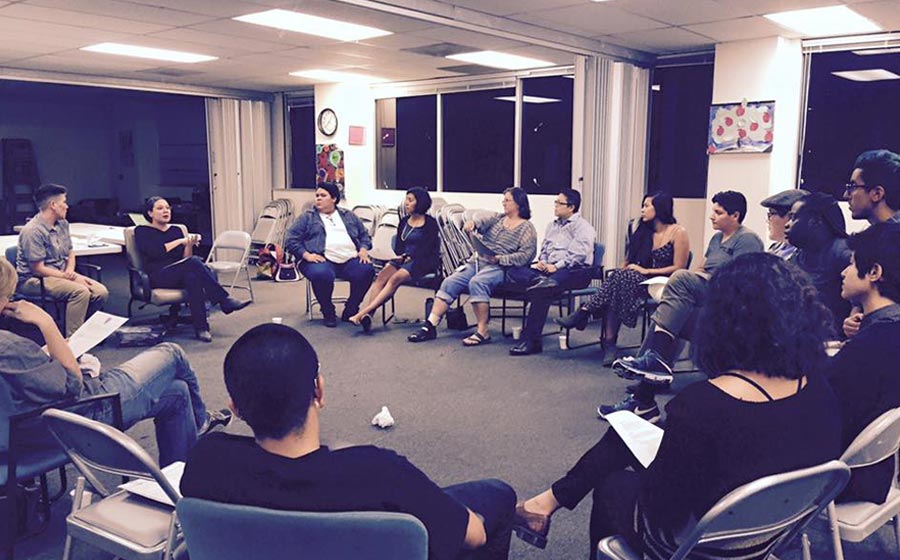
Gender Justice L.A. is a member-based, grassroots organization that works towards a safe and just society for all transgender, intersex and gender non-conforming people. They believe all transgender people should have access to quality, respectful, and affordable health care; freedom from bigotry, harassment, and violence; opportunities for education, employment, and leadership; safe spaces for enhancing spiritual, physical, and social wellness; and the right to self-determination. Through a combination of policy advocacy and community building, Gender Justice L.A. has secured concrete gains for the trans community in L.A. such as changes in the police patrol guide for the fair treatment of trans people and trans prisoners. GJLA continues to fight anti-trans forces in California, responding to attacks on rights they have already secured. GJLA’s program TRANSform LA is known for its series of workshops over the course of 6 months for trans* and gender nonconforming people. Participants are empowered and given skills to continue working towards radical transformation in Los Angeles.
This organization is supported through the Funding Queerly Giving Circle, which is housed at Astraea.
El/La works to build a world where transgender Latinas (translatinas) feel they deserve to protect, love and develop themselves.
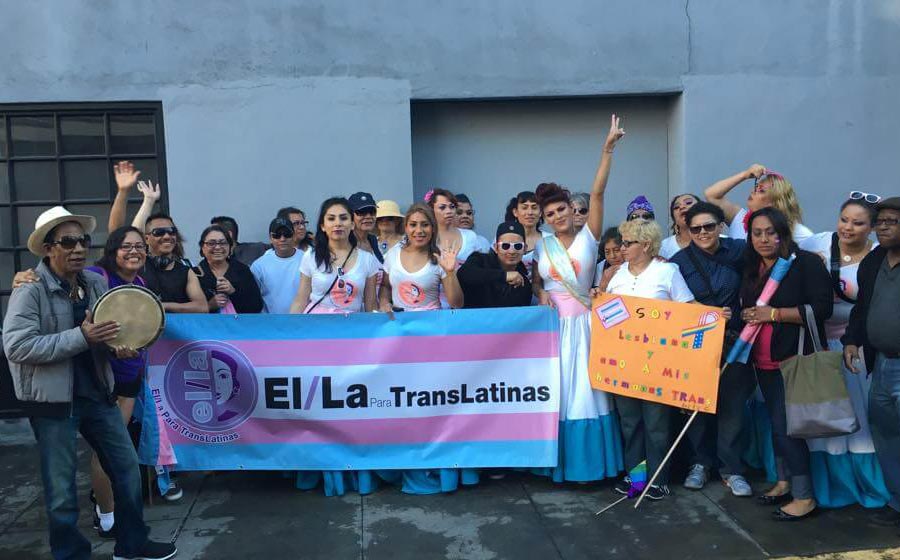
El/La works to build a world where transgender Latinas (translatinas) feel they deserve to protect, love and develop themselves. By building this base, they support translatinas in protecting themselves against violence, abuse, and illness, and in fully realizing their dreams. El/La is an organization for translatinas that builds collective vision and action to promote their survival and improve their quality of life in the San Francisco Bay Area. Their scope of work includes: (1) HIV Prevention – outreach, education, testing, peer-to-peer counseling, accompaniment, and referrals and accompaniment; (2) Violence Prevention – case management, referrals and accompaniment, and Luchadoras Leadership Development and Translatina Council/Consejo Translatina; and (3) Safe Space and Community – evening drop-in, family-style celebrations, social networking, expression of spirituality, and life skills groups. As a result of these programs they in turn go out and educate community members about risks to their health and safety, support each other in identifying barriers to full participation in society, and find resources to overcome those barriers. El/La builds visibility and alliances to respond to transphobic attacks and has worked with over 105 city agencies, service providers, programs and collaboratives in San Francisco, the greater Bay Area and beyond. Their work strengthens translatinas’ ability to critique and respond to the systems of violence they face, and the continuation of anti-violence programs addressing violence against translatinas.
Freedom, Inc. (FI) challenges the fundamental root causes of violence against women, queer and trans folx, and youth through leadership development, radical service providing, and community organizing in low-income communities of color–focusing on Black and Southeast Asian communities.
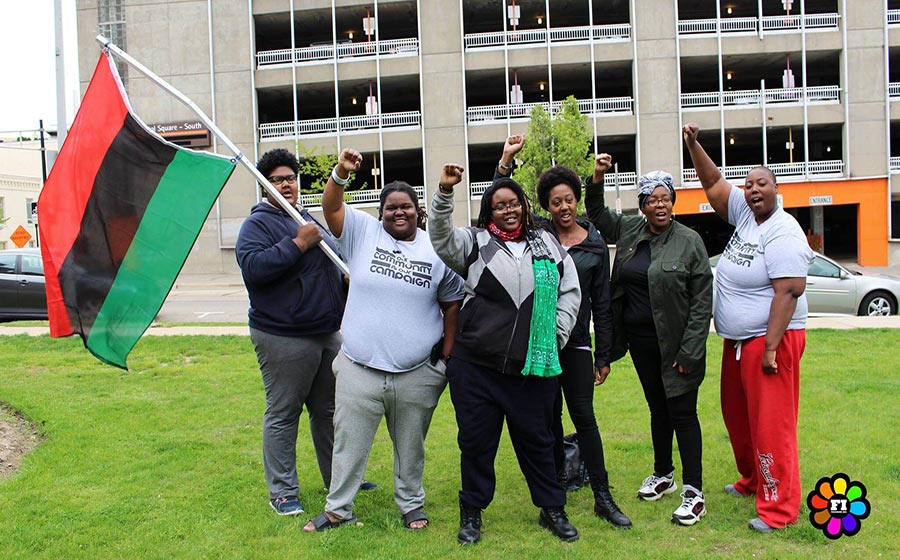
Freedom, Inc. (FI) challenges the fundamental root causes of violence against women, queer and trans folx, and youth through leadership development, radical service providing, and community organizing in low-income communities of color–focusing on Black and Southeast Asian communities. FI’s anti-violence work includes working against systemic and institutional violence of poverty, sexism, racism, heterosexism, and cisgenderism as well as their interpersonal expressions of domestic and sexual violence. Their programs aim to change cultural norms into which people are socialized (addressing the root causes of violence and internalized oppression) and build capacity for survivors as leaders in their communities to organize for institutional change and accountability.
Streetwise and Safe: LGBTQQ Youth of Color Standing Up to Police Abuse and Criminalization (SAS) is a collaborative multi-strategy initiative to develop leadership, knowledge, and skills among LGBTQQ youth of color who have experienced gender-and-sexuality-specific forms of race and class based policing, particularly in the context “quality of life” policing and the policing of sex work and trafficking in persons.
 on GLYPH.jpg)
Streetwise and Safe: LGBTQQ Youth of Color Standing Up to Police Abuse and Criminalization (SAS) is a collaborative multi-strategy initiative to develop leadership, knowledge, and skills among LGBTQQ youth of color who have experienced gender-and-sexuality-specific forms of race and class based policing, particularly in the context “quality of life” policing and the policing of sex work and trafficking in persons. SAS has been very active in the Communities United for Police Reform (CPR) campaign, and is the only LGBTQ youth of color organization part of CPR’s steering committee. Their critical participation highlights the ways in which “Stop and Frisk” practices not only affect black and brown men, but LGBTQI youth of color in particular. SAS, along other NY-based grantee partners, contributed to the passing of the Community Safety Act. More recently, they pushed the passing of a partial “No Condoms as Evidence” policy and are now part of the decision making table evaluating policy implementation. SAS and BreakOUT! are leading the Get Yr Rights National Network.
Coalition Advocating for Inclusion of Sexual Orientation (CAISO) is a coalition of individuals and groups connected to LGBT communities in Trinidad and Tobago.
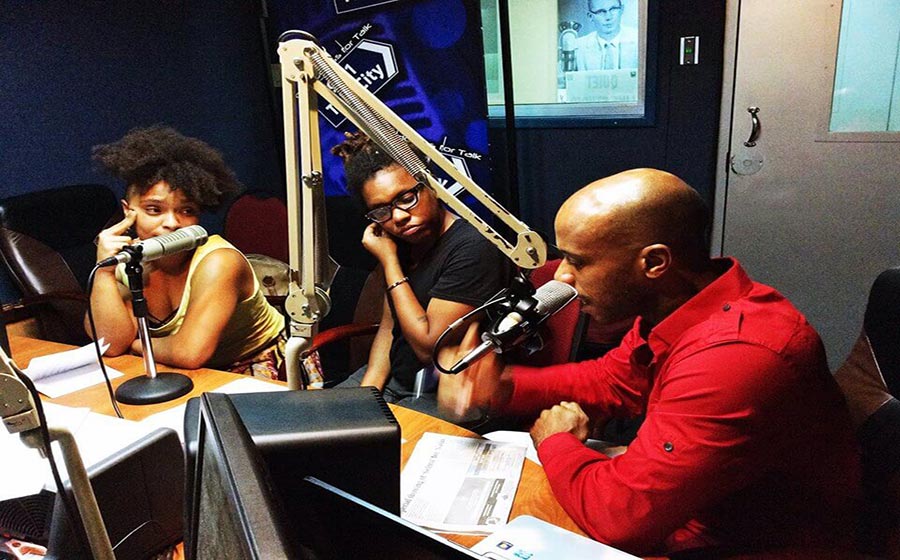
Coalition Advocating for Inclusion of Sexual Orientation (CAISO) is a coalition of individuals and groups connected to LGBT communities in Trinidad and Tobago. CAISO’s aims are to foster a forward-thinking, visionary and humane approach to sexual orientation and gender identity; secure full inclusion in all aspects of national life, social policy and citizenship; develop capacity, leadership and self-pride in communities; and mobilize an advocacy movement for social justice. CAISO has participated in Trinidad and Tobago’s constitutional reform process, advocating for human rights protections. The organization provides legal and psychological accompaniment to LGBT members who experience human rights violations, and engages in ‘everyday lawyering’ with the long-term goal of building up documentation for a decriminalization case. They also use popular education and a ‘wholeness and justice’ approach to engage LGBT community members in healing past trauma, building resilience and taking collective action.
GALANG was formed in 2008 by a small group of lesbian activists who saw that the LGBT sector in the Philippines was predominantly middle-class.
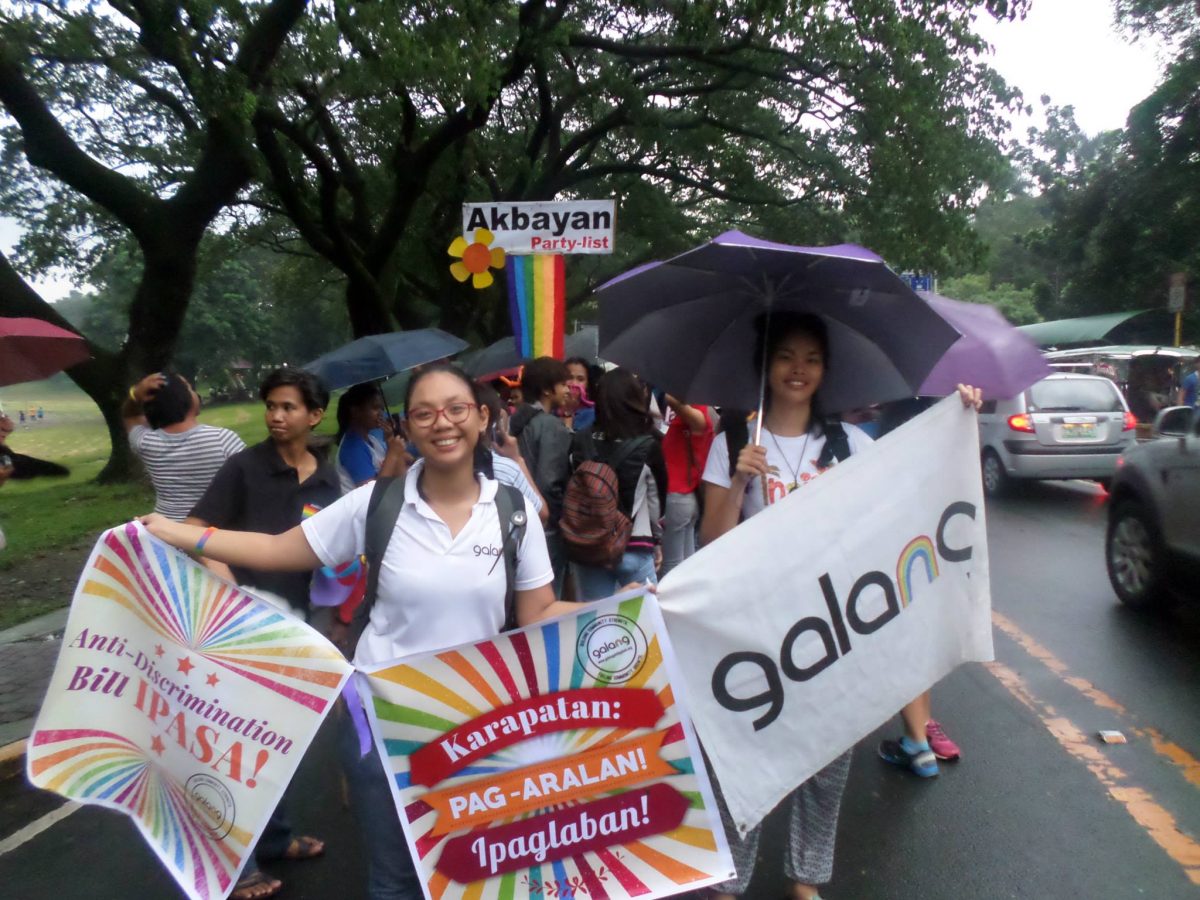
GALANG was formed in 2008 by a small group of lesbian activists who saw that the LGBT sector in the Philippines was predominantly middle-class. Given the realities observed on the ground, the group decided to establish an organization that could be a catalyst for the empowerment of Filipino lesbians, bisexual women, and trans men (LBTs) in urban poor communities to attain social and economic equity, and create an enabling policy environment. GALANG helped establish four (4) LBT people’s organizations with members living in seven (7) depressed areas/barangays (villages) of Quezon City. GALANG continuously works with LBT organizations as its partners, and recently expanded its scope of work to include heterosexual families and friends of LBT members. GALANG aims to support a cohort of LBT community members who can mobilize their peers around sexual and LBT human rights; create new/strengthen grassroots organizations of urban poor LBTs; support urban poor LBTs to access technology and skills development trainings, and to use these skills in gaining employment or engaging in income generating activities; get village development councils and local community leaders to issue statements of support promoting LBT human rights; and promote Filipino research and advocacy work on the intersections of sexuality and poverty.
Santamaría Fundación focuses its work on the idea of self-determination.

Santamaría Fundación was founded in 2005 by four trans women who had witnessed the death of one of their friends as a result of lack of access to health services. Today, Santamaría Fundación has ten years of experience in fostering the leadership of transgender, transgender and transvestite people in Cali, the fourth largest city in Colombia and one with one of the highest levels of transphobic hate crimes. They also works with migrants who come to Cali in search of opportunities. Santamaría Fundación focuses its work on the idea of self-determination. It provides legal support for trans women, implements holistic health strategies and campaigns, and advocates for policies with local and national governments. Santamaría Fundación’s current strategies include laying the groundwork for a campaign for a gender identity law; Documenting human rights violations through its “Observatory” program on human rights; Monitor the police; Raise the visibility of LGBT people and build alliances with other social movements; And organize the annual march for sexual and gender diversity in the Pacific region in Cali. *** En Español*** Santamaría Fundación fue fundada en 2005 por cuatro mujeres trans que habían sido testigos de la muerte de una de sus amistades como resultado de la falta de acceso a servicios de salud. Hoy, Santamaría Fundación tiene diez años de experiencia fomentando el liderazgo de mujeres trans, personas transgénero y travestis en Cali, la cuarta ciudad más grande de Colombia y una con uno de los niveles más altos de crímenes de odio transfóbicos. También trabaja con migrantes que vienen a Cali en busca de oportunidades. Santamaría Fundación enfoca su trabajo en la idea de la autodeterminación. Ofrece acompañamiento legal para las mujeres trans, implementa estrategias y campañas de salud holística y hace trabajo de defensoría de políticas con gobiernos locales y nacionales. Las estrategias actuales de Santamaría Fundación incluyen sentar las bases para trabajar una campaña por una ley de identidad de género; documentar las violaciones de derechos humanos a través de su programa “Observatorio” de derechos humanos; monitorear a la policía; elevar la visibilidad de las personas LGBT y construir alianzas con otros movimientos sociales; y organizar la marcha anual por la diversidad sexual y de género en la región del Pacífico en Cali.







 on GLYPH.jpg)



